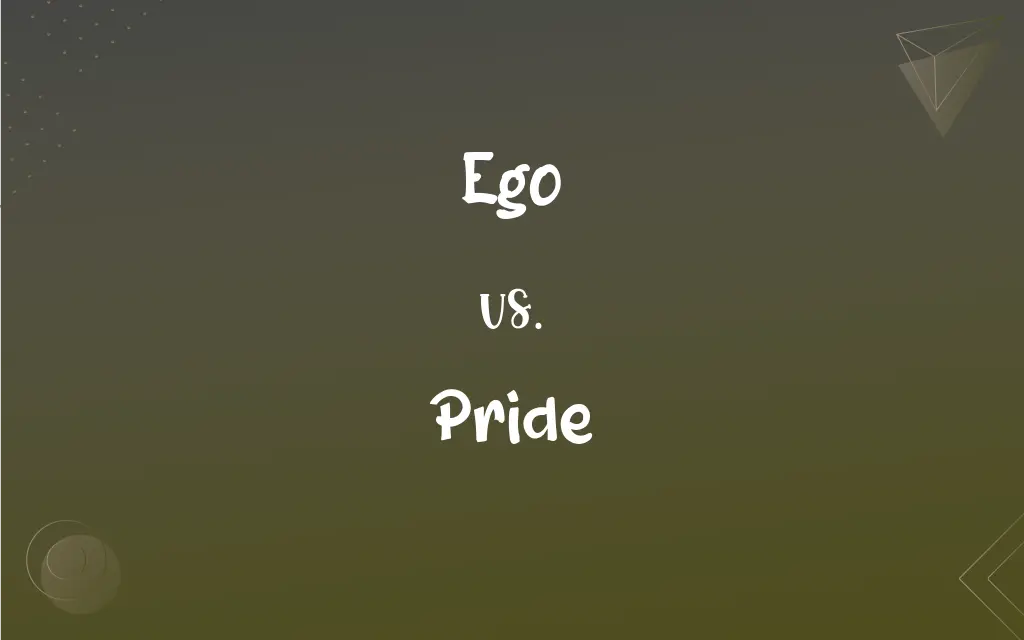Ego vs. Pride: What's the Difference?
Edited by Janet White || By Harlon Moss || Updated on October 12, 2023
Ego is an individual’s sense of self-esteem or self-importance, while pride refers to a feeling of satisfaction derived from one’s own achievements or from qualities that are widely admired.

Key Differences
Ego essentially encapsulates one’s perception of their own value and importance, often associated with self-esteem and self-worth. On the contrary, pride generally stems from a sense of accomplishment or from appreciating certain qualities either within oneself or others. Ego can inflate one’s perception, prioritizing self above others, while pride can also derive from a healthy recognition of self-worth and achievements.
Notably, ego is frequently perceived with a slightly negative connotation, being associated with an inflated sense of self that may disregard the perspectives or feelings of others. Pride, alternatively, may be viewed in dual lights: it can denote a healthy acknowledgment of one’s achievements or a detrimental, excessive self-admiration. Ego tends to universally center on the self, while pride can span admiration for both personal and external attributes or accomplishments.
Ego can potentially mislead individuals into a tunnel vision of self-focus, where the considerations, needs, and feelings of others might be inadvertently neglected. Whereas, pride, when balanced, facilitates a healthy recognition and celebration of accomplishments, whether they are personal or belong to others. Pride occasionally leans towards a collective sentiment, embracing shared achievements, while ego predominantly remains self-oriented.
It’s pertinent to discern that ego often serves as a defensive shield, protecting one’s self-perception and harboring potential vulnerabilities. In contrast, pride, particularly when excessive, can teeter on the brink of arrogance, where one’s accomplishments or qualities are perceived as superior. Both ego and pride navigate through the intricate weave of self-perception and external validation, yet they delineate different aspects and impacts of self-evaluation.
However, both ego and pride have their places and utilities in our emotional and psychological landscapes. A balanced ego safeguards our confidence and ensures assertiveness, while healthy pride allows us to derive joy and satisfaction from our achievements and positive qualities. Both embody complex, multi-faceted emotions that require conscientious management to navigate interpersonal relationships effectively.
ADVERTISEMENT
Comparison Chart
Definition
Sense of self-importance and esteem.
Satisfaction from achievements or admired qualities.
Connotation
Often slightly negative.
Can be positive or negative depending on context.
Orientation
Generally self-focused.
Can be focused on self or others.
Protection
Shields and possibly hides vulnerabilities.
May expose vulnerabilities through expression.
Association
Linked with self-worth and self-perspective.
Associated with achievements and admirable qualities.
ADVERTISEMENT
Ego and Pride Definitions
Ego
Ego is a person’s sense of self-esteem and self-importance.
His ego prevented him from acknowledging his mistakes.
Pride
Pride might also represent a group of lions forming a social unit.
The pride roamed the savannah, with the males guarding the territory.
Ego
In psychoanalysis, the ego represents the part of the mind that mediates between the conscious and the unconscious.
The ego strives to satisfy both basic instincts and societal norms.
Pride
Pride refers to a feeling of deep pleasure or satisfaction derived from achievements.
Her pride was evident when her daughter graduated with honors.
Ego
Ego, in spiritual contexts, refers to the self and its attachment to worldly values.
Enlightenment often involves transcending the ego.
Pride
Pride can denote the consciousness of one's own dignity.
He swallowed his pride and apologized.
Ego
Ego can refer to the self, especially as distinct from the world and other selves.
She needed to set aside her ego to listen empathetically.
Pride
As a verb, to pride oneself means to be especially proud of a particular quality or skill.
She prides herself on being an empathetic listener.
Ego
Ego might denote an exaggerated sense of self-significance and arrogance.
The athlete's ego was visible in his dismissive behavior towards teammates.
Pride
Pride can be a feeling that you respect yourself and deserve to be respected by others.
Pride in oneself can serve as a motivator to persevere.
Ego
The self, especially as distinct from the world and other selves.
Pride
A sense of one's own proper dignity or value; self-respect.
Ego
In psychoanalytic theory, the division of the psyche that is conscious, is responsible for our feelings of selfhood, and most directly interacts with external reality.
Pride
Pleasure or satisfaction taken in an achievement, possession, or association
Parental pride.
FAQs
How can a large ego impact relationships negatively?
A large ego can hinder effective communication and empathy, possibly leading to conflicts in relationships.
Can pride be collective instead of individual?
Yes, pride can be collective, experienced by groups or communities regarding shared achievements or qualities.
Is the ego only associated with arrogance?
No, the ego encompasses self-perception and self-importance, and isn’t solely associated with arrogance.
What constitutes an individual’s ego?
An individual’s ego comprises their sense of self-worth and self-importance.
How do cultural perspectives influence perceptions and expressions of ego and pride?
Cultural perspectives significantly influence perceptions and expressions of ego and pride by defining what is valued, acceptable, and how self and accomplishments are viewed and celebrated in a societal context.
Is pride always linked with achievements?
No, pride isn’t always linked with achievements; it can also be related to appreciating innate qualities, affiliations, or associations that are valued by an individual or group.
Can pride be related to concepts other than accomplishments and qualities, such as identity?
Yes, pride can relate to identity, where individuals feel a collective sense of esteem and belonging regarding a shared identity or affiliation.
Can pride be considered a positive emotion?
Yes, pride can be positive when it celebrates genuine achievements without demeaning others.
Can pride also refer to groups or events not related to personal accomplishments?
Yes, pride can refer to groups or events, such as LGBTQ+ Pride, reflecting collective identification, celebration, or support for particular communities or causes.
Can pride also denote a group in the animal kingdom?
Yes, pride can denote a group of lions, reflecting a social and biological unit within the species.
Can ego and pride be considered emotions, traits, or both?
Ego and pride can be considered both emotions and traits; they manifest in feelings (emotions) and can also be characteristic of an individual’s personality (traits).
Can pride be exhibited toward others’ accomplishments?
Yes, individuals can exhibit pride toward others’ accomplishments, often stemming from a connection or affiliation with those individuals.
How might suppressing the ego impact an individual?
Suppressing the ego may diminish self-esteem, possibly hindering assertiveness, self-advocacy, and could potentially impact mental well-being.
How does pride differ when it's considered a vice versus a virtue?
When considered a vice, pride reflects an inflated sense of one's worth or achievements; as a virtue, it signifies a healthy and justified self-respect and satisfaction in accomplishments.
How is the ego conceptualized in psychological theories, such as Freud’s theory?
In Freud’s theory, the ego is conceptualized as the mediator between the impulsive id, the moralistic superego, and external reality, working to achieve harmony among these elements.
Can a healthy ego contribute positively to an individual’s life?
Yes, a healthy ego contributes positively by providing confidence, ensuring assertiveness, and aiding in the navigation of social interactions and relationships constructively.
Can ego and pride be developed or altered through experiences and introspection?
Yes, ego and pride can be developed and altered through experiences, reflections, and active efforts towards personal growth and understanding.
How does an inflated ego affect a person’s self-perception?
An inflated ego can distort self-perception, often leading to an overestimated self-value and underestimation of others, possibly hindering personal growth and social relationships.
How do concepts of ego and pride play into societal norms and values?
Ego and pride intersect with societal norms and values, often being shaped by and shaping societal expectations, moral codes, and cultural perceptions of self and achievement.
Is it possible to have pride without an ego?
It's complex, as ego (self-perception) often informs pride; however, one might feel pride for others or collective groups, which might not directly involve their own ego.
About Author
Written by
Harlon MossHarlon is a seasoned quality moderator and accomplished content writer for Difference Wiki. An alumnus of the prestigious University of California, he earned his degree in Computer Science. Leveraging his academic background, Harlon brings a meticulous and informed perspective to his work, ensuring content accuracy and excellence.
Edited by
Janet WhiteJanet White has been an esteemed writer and blogger for Difference Wiki. Holding a Master's degree in Science and Medical Journalism from the prestigious Boston University, she has consistently demonstrated her expertise and passion for her field. When she's not immersed in her work, Janet relishes her time exercising, delving into a good book, and cherishing moments with friends and family.































































